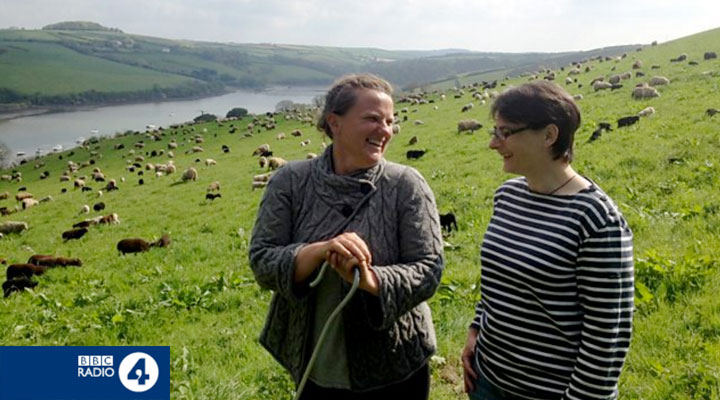Good reasons for being a Pasture for Life farmer

On Sunday July 10, BBC Radio 4 listeners woke to hear the inspirational story of Rebecca Hosking and her partner Tim, as they moved their 1,000 different coloured sheep to a new patch of grazing.
Rebecca, who is a certified Pasture for Life farmer, took over the tenancy of Village Farm three years ago. She set about using methods that built, rather than destroyed soils, which increased wildlife whilst producing good food. And this is where mob grazing comes in.
“Mob grazing is a way of farming which mimics nature, originated by Allan Savoury, after he had watched the wild herds in Africa,” said Rebecca.
“He noticed the herds were always large, bunched tightly together and that they were always moving. And the main reason for this movement was predators. Obviously in Africa you have lions and hyenas. In South Devon we have electric fences instead! But basically the principle is the same. It’s to keep a large amount of animals tightly packed and moving all the time – which regenerates the soil.”
After fencing off some orchids so they can set seed and setting up the new electric fence line, Rebecca went on to tell Sarah more about the benefits of mob-grazing.
“It’s all about the resting period. Herbivores, like any animal have favourite foods that they go back and eat again and again.
“Essentially by doing that they are weakening the plants. So by these guys coming in at speed, they are all in competition with each other rather than having the time to think about which plant they want to eat. It’s sort of a mad buffet.
“They are going to run in here, grab off the table what they can, eat it down and then leave. Rather than the other way, which would be: the buffets there, there are four of us and we just pick at our favourite things.
“Depending on the weather and the grass growth, they will be back between three or four months time.”
Rebecca then explained why this kind of grazing is so good for soil health.
“By having high plants above ground the roots below are a lot longer. When the animals come in and slough off the top, the plant naturally cuts off its roots below to balance itself. But those roots are carrying carbon.
“And if you have healthy soil, with bio-diversity and fungi in it, it takes the carbon from the plants and stores it into the soil. All grazing locks down carbon, but this way of grazing – as long as you never plough your field again and release it back into the atmosphere, locks the carbon in.”
In the final part of the programme, Rebecca took Sarah up the hill to listen to the skylarks.
“We personally believe that wildlife is just as important as the livestock. We see them all as equal on this farm.”
Sarah asked Rebecca how she makes any money out of this system of farming.
“You make money by saving money,” said Rebecca. “We are organic so save on inputs, we don’t house the sheep in winter so save on straw bedding and the constant moving means we save on vet’s bills as the sheep do not need worming.
“We also sell direct, selling different sized meat boxes straight to customers’ homes. And we’re doing restaurants as well.
“We could charge a premium if I wanted to, but I don’t believe we should. I think because we’ve made a lot of savings in the way we are rearing our animals and farming this land, that we pass that on.”
At the end of the programme, Rebecca explained how she is trying to quantify how much carbon is being locked into her mob-grazed soils.
“There is a lot of anecdotal evidence about this from farmers – and we can all, as farmers, go out and test our soils for carbon. I think a lot of the science is now catching up.
“We’ve got the Rothamsted Institute coming in to take soil samples and measure them starting this summer. I know we are locking down carbon, but how much we’re locking down, now that’s the question. We won’t know for five years because it takes a while.”
Rebecca ended by saying:
“Every year when we’re hearing more birds in the sky and seeing more flowers and more trees growing on our land, it is creating a diversity of life around us and it’s really rewarding. You know money can’t buy it.”
You can listen to Rebecca’s story on the BBC iPlayer (while available).



